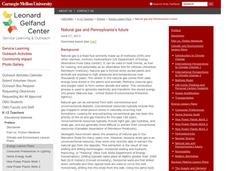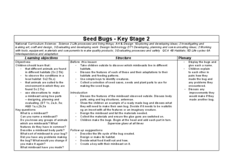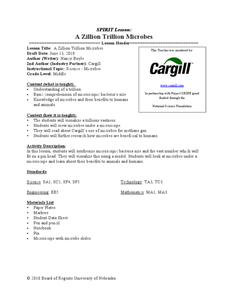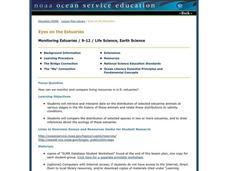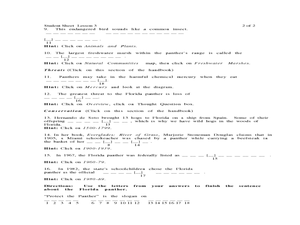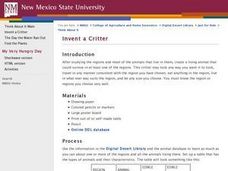Curated OER
Where Are the Dinosaurs?
Students create a dinosaur egg with balloons and newspaper. For this earth science lesson, students explore the extinction of dinosaurs. Students view a web clip and relate it to the extinction of animals they have never seen.
Curated OER
One is a Snail, Ten is a Crab.
Students count by pairs and sets of feet, while reading a story that coincides with this practice. In this math lesson, students use their skills to count by multiples and adding on to numbers when they add up feet from humans, and...
Carnegie Mellon University
Natural Gas and Pennsylvania’s Future
Beginning with a general discussion about natural gas, methane, and hydrocarbons, a few videos and diagrams are projected to support the lecture. Individuals participate in a brief activity by drinking juice through a straw, and then...
Curated OER
"Five Little Seeds"
Fourth graders complete various activities related to the plant life cycle. They read the book "The Tiny Seed," read and discuss the poem "Five Little Seeds," complete a "Plantenstein Mystery" and other online activities, write and...
Curated OER
How Do You Know A Panther Was Here?
Students research the signs that panthers leave. In this panther track instructional activity, students conduct Internet research into the signs that panthers leave such as tracks, scat, scrapes, and scratches. They make a...
Curated OER
Seed Bugs; Stage 2
Students examine nature by participating in an environmental art activity. In this imaginary creature lesson, students discuss the importance of a habitat when pertaining to wild animals or bugs. Students utilize tree parts which they...
Curated OER
Cell-ebrations in Science
Students recognize that all living things are made up of cell and that they cannot easily be seen by the naked eye. Students become familiar with the use of microscopes as a tool for investigation.
Curated OER
A Zillion Trillion Microbes
Students observe microbes under a microscope. In this biology lesson, students describe how Cargill uses them to produce methane. They research the benefits and harmful effects of microbes in society.
Curated OER
Forest Friends Forever
Students investigate how to use the senses to gather information about objects such as size, shape, color, texture, sound, position, and change (qualitative observations are utilized throughout this lesson). They investigate and explain...
Curated OER
Identifying Sea Ice
Young scholars study different types of sea ice and interview an Yupik elder or local hunter. In this sea ice lesson, students study the native language for sea ice terms. They interview an elder from Alaska's northern coast about their...
Curated OER
Adaptations
Eighth graders choose an animal and research its various adaptations using
their information, 8th graders create an informational tri-fold brochure or newsletter. They should include facts about the animal's adaptations as well as...
Curated OER
Eyes on the Estuaries
High schoolers study estuaries and compare several ones in the U.S. In this estuary lesson students interpret data and compare the distribution of different species.
Curated OER
Panther Scavenger Hunt
Students research a website to learn about the Florida panther. In this animal research instructional activity, students use the scavenger hunt directions to search a website about Florida panthers. Students also solve word puzzles...
Curated OER
Invent a Critter
Students create a living animal that could survive in at least one specific region and use the digital desert library to gather information. In this invent a critter instructional activity, students draw a picture of their animal, ...
Curated OER
Classifying Organisms within Kingdoms
Learners examine animal kingdom classifications. They discuss how animals are placed into kingdom classifications and compare similarities and differences of animals within a kingdom.
Curated OER
"Home Sweet Home?"
Pupils research an endangered animal's habitat, investigate the survival problems. They research the animal's zoo life. They research some programs of reintroduction and chart the pros and cons of each.
Curated OER
Surveying an Environment / Ecosystem
Students visit a local ecosystem to survey the plants and animals present and identify interactions between organisms. They identify interactions that occur between living organisms and their ecosystem and present their ecosystem to the...
Curated OER
Bird Stories: Fact or Fiction
Students evaluate/distinguish scientific fact from fiction. They discuss similarities and differences in the life cycles of various birds. Student use the Internet as a research tool.
Curated OER
Dancing Flamingos
Students, through the media of dance and drama, discover how an animal's behavior helps them to survive in the environment. They practice performing or mimicking how a flamingo's acts and positions itself when being observed. The...
Curated OER
Who's for Dinner?
Fifth graders examine life systems within different biomes. They choose paper plates with the names of animals on them. They research the animals, write reports and draw pictures of them. They create a food chain model by arranging the...
Curated OER
Photomosaic Pixel Composite
Young scholars research the habitat, diet, life cycle, and characteristics of an animal, and create a Japanese scroll painting of their animal. Using scanned images of animals they have painted, they create a composite mosaic using...
Curated OER
Polishing the Petoskey
Students select a stone and polish it. Throughout the process they demonstrate an understanding of rocks and fossil formation.
Curated OER
Dino Detectives
As students examine maps of Utah, 4th graders search for clues about what prehistoric life was like in Utah.
Curated OER
Turtle Sightings
Third graders research turtles and the ways they have adapted to their marine environment. They work in groups and publish their findings using SiteMaker a web-authoring tool.




